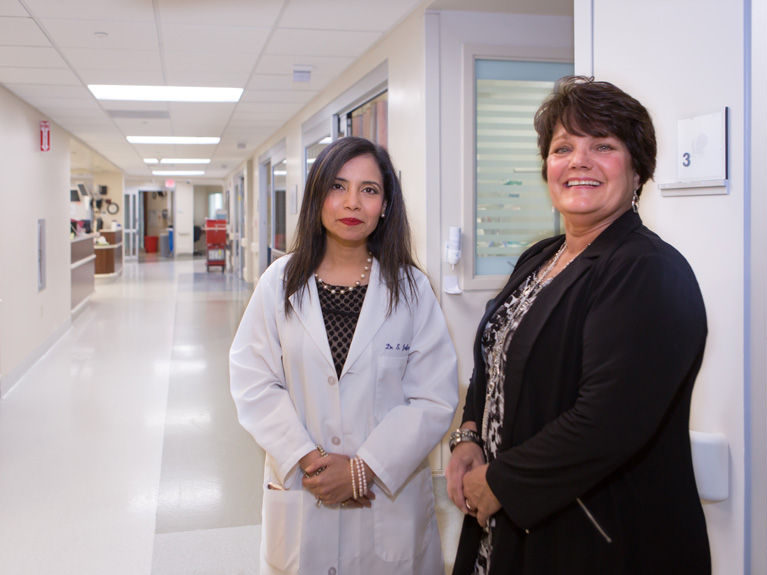
Thirty-one million Americans have this disease and it is the eighth leading cause of death in the country, but CKD – or chronic kidney disease – has been flying under the national publicity radar for years.
In fact, according to the American Kidney Fund, nine out of 10 people who already are in stage three of this five-stage disease don’t even know they have it.
If Dr. Saatiah Jaffry, a board certified nephrologist at Coastal Kidney Care and Hypertension and the Sebastian River Medical Center has her way, that may soon change thanks to a no-cost community outreach program called Kidney Smart.
Kidney Smart is the brain-child of a multi-disciplinary team of healthcare providers like Jaffry and registered nurse and renal dietician Michelle Galloway, health educators and DaVita Healthcare Partners, Inc., one of the nation’s largest kidney care providers.
“Basically,” explains Jaffry, “chronic kidney disease is slowly progressive kidney dysfunction. What happens is that almost everyone after the age of 50 or 55 starts losing a little bit of kidney function. If you have diabetes or high blood pressure or maybe vascular disease or other risk factors, you may lose kidney function faster.”
“In the Sebastian and Vero Beach areas,” Jaffry continues, “we have a lot of retirees so it’s a little bit more common here.”
Indeed, according to the National Institute of Diabetes and Digestive and Kidney Diseases, the incidence of CKD in Americans 65 and older has more than doubled in the past 10 years and currently affects nearly a quarter of those in that age group.
Jaffry says CKD is “very easily detected” by a primary care physician, but that outward signs may be difficult for individuals to identify.
In its early stages, symptoms such as loss of appetite, fatigue and weakness, sleep problems, changes in urine output, muscle twitches and cramps, hiccups and swelling of feet and ankles along with high blood pressure may be present – but all of those can indicate other problems, too.
“Everyone,” Jaffry elaborates, “is aware that the kidneys get rid of toxins [in the body] but they also maintain your blood pressure because they make certain hormones which control blood pressure and they also control the sympathetic system, which helps control blood pressure.”
Should CKD reach stage five, kidney failure will occur and the only treatment options at that point are dialysis or a kidney transplant. Neither is a desirable situation.
Kidney dialysis is basically life-support. It generally falls into two categories. Most commonly, a patient’s blood is mechanically filtered using a dialysis machine or a dialyzer; the other option is peritoneal dialysis in which surgery is performed to create a pocket in the patient’s abdomen. A catheter is then attached and a special cleaning solution and the lining of the abdomen are used in to mimic the filtering function of the kidneys. According to the National Kidney Foundation, approximately 450,000 Americans are currently on dialysis of one form or another.
According to the Kidney Foundation, “More than 122,000 Americans currently are on the waiting list for a lifesaving transplant . . . [while] fewer than 17,000 people receive one each year.”
So, 105,000 of those 122,000 on the waiting list won’t get their transplant this year. And maybe not the next year, or the year after that, either.
The CKD story, however, is not entirely one of doom and gloom. Jaffry enthusiastically points to several encouraging facts. First, as mentioned earlier, CKD can be, “very easily detected,” by a physician. While Jaffry says it’s usually a part of any annual physical, patients can gain some additional peace of mind by requesting their doctor run a “glomerular filtration rate” or GFR test.
Moreover, Jaffry exclaims, “If [CKD] is detected early, the treatment might not even be prescription drugs. To me, dietary and lifestyle modifications are just as important – or maybe even more important – than medications.”
“For example,” Jaffry continues, “there’s the DASH diet, which the National Kidney Foundation endorses. That’s basically a diet high in fruits, vegetables, nuts, seeds. All the major leading national organizations have endorsed it and they have found that following a DASH diet reduces your blood pressure, reduces your risk of heart disease, stroke and vascular disease.”
In other words, a diagnosis of CKD needn’t lead everyone down the road to dialysis or transplant. Lifestyle and diet changes along with avoiding certain over-the-counter medications and supplements can often stop, or at least dramatically slow, the disease’s progression.
Jaffry says excessive use of of non-steroidal anti-inflammatory drugs or NSAIDs such as Aleve, Advil and Ibuprofen can cause kidney problems as can herbal supplements such as “Mobic,” but she advises everyone it’s best to consult their physician before any change is made.
Kidney Smart will hold free classes in the Sebastian River Medical Center cafeteria on the third Wednesday of each month starting January 19, 2016 at 3 p.m.
Dr. Saatiah Jaffry can be reached at Coastal Kidney Care & Hypertension at 7965 Bay Street, Suite Six in Sebastian. The phone number is 772-918-8487. Michelle Galloway can be reached at the Sebastian Dialysis Clinic at 1414 U.S. 1 in Sebastian. Her phone number is 772-589-9182. For more information on Kidney Smart, go to www.kidneysmart.org.



